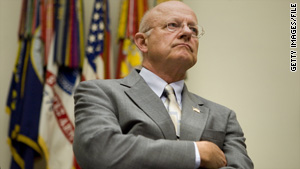Source: Retired general is pick for new intelligence chief

- Retired Air Force Lt. Gen. James Clapper to be nominated for intelligence post
- If confirmed, Clapper would replace Dennis Blair, who resigned last month
- Clapper is currently a top Pentagon intelligence official
Washington (CNN) -- President Obama plans to nominate retired Air Force Lt. Gen. James Clapper to be the new director of national intelligence, a senior U.S. defense official confirmed to CNN Friday.
Clapper, now a top Pentagon intelligence official, would replace Dennis Blair, who resigned at the end of last month.
The announcement will be made Saturday at the White House, the official said.
If confirmed, Clapper will become the nation's fourth DNI in the last five years. The position was created after the September 2001 terrorist attacks to oversee the 16 agencies of the U.S. intelligence community.
Clapper, who retired from the Air Force in 1995 after a 32-year career, served as head of the National Geospatial-Intelligence Agency from September 2001 to June 2006. He has served as the under secretary of defense for intelligence since April 2007.
Some political observers have indicated that Clapper's prospects for confirmation on Capitol Hill, however, are questionable.
California Sen. Dianne Feinstein, the Democratic head of the Senate Intelligence Committe, recently said the "best thing for the U.S. intelligence community is to have someone with a civilian background in charge."
The ranking Republican on the Intelligence Committe, Missouri Sen. Kit Bond, said he has reservations about Clapper. "I believe he is too focused on the Defense Department issues and he has tried to block out efforts to give more authority to the DNI," Bond said.
Bond's counterpart on the House side, Rep. Pete Hoekstra, R-Michigan, also said he believes Clapper is the wrong person, because he is "not forthcoming, open or transparent" with Congress.
Blair, a retired admiral, was pressured to resign as DNI because of differences with the White House over the scope of his role and turf wars with CIA Director Leon Panetta and other members of the intelligence community. One source familiar with Blair's situation said that from the very beginning, "the White House did not have the same view (as Blair) of what the DNI should be."
That might be the crux of the problem. The law that created the position of DNI after the 9/11 terrorist attacks is too "ambiguous," said Lee Hamiliton, a former congressman who pushed Congress for intelligence reform.
Hamilton, the co-chairman of the 9/11 Commission, recently told a congressional hearing that "the role of the DNI is not clear ... and as long as you have the ambiguity, you're going to have these agencies fighting for jurisdiction and power."
The DNI needs to be empowered with the budget and personnel authorities to lead the community, otherwise, the director is merely a coordinator, Hamilton said.
Some question whether it is possible to change the law, considering the difficulty Congress had in getting the original agreement. Bond said Congress must act to give the DNI clear budget authority and chain of command within the intelligence community. Feinstein has called on the president to define the DNI role and then work with Congress to make it law. Hamilton said a fix is needed now, that it can't wait for the longer-term legislative correction.
Hoekstra says changing the law is not the answer. "If you have great people working together, even in a mediocre structure, they can make things happen. More strengths and authorities in the law doesn't guarantee success," he said.
There does seem to be widespread agreement on one needed component: presidential action in support of the DNI. Hamilton said the "burden is on the president now to clarify who is in charge of the intelligence community -- where the final authority lies on the budget, personnel and other matters."
Rep. Bennie Thompson, the chairman of the House Homeland Security Committee, recently wrote a letter to Obama urging him "to remove obstacles which may have formed a stumbling block for others who held the DNI position."
John Brennan, the president's chief counterterrorism adviser in the White House, recently said the administration is trying to ensure the intelligence community is "integrated well and orchestrated well" by the DNI.
"We want to make sure the DNI's role is clear and is able to optimize the contributions that the intelligence community makes on a daily basis," Brennan said.
CNN's Barbara Starr and Pam Benson contributed to this report
